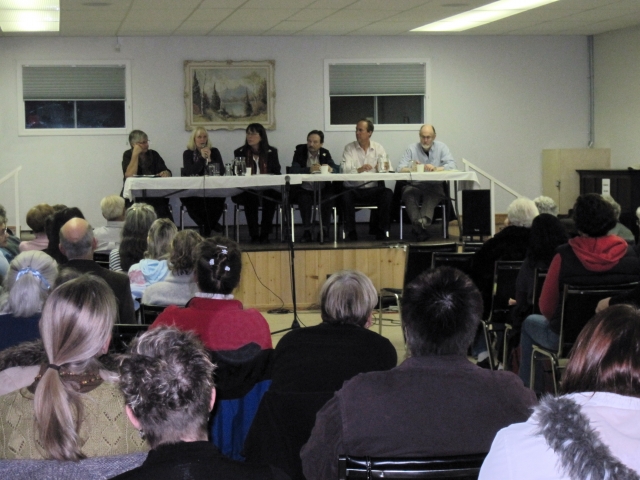REVIEW: Bearing the brunt of poverty
Heated, passionate comments arose from the public as a film and panel presentation on the subject of poverty in this community and across the nation brought the issue of the working poor to the forefront. Over 80 people attended the screening of the film “Poor No More” and a poverty forum co-sponsored by MP Alex Atamanenko (BC Southern Interior) and the Boundary Women’s Resource Centre (BRWC) at the Seniors Centre on Tuesday evening Nov. 9. Poor No More, a film directed by Bert Deveaux and produced by Suzanne Babin (both former CBC documentary producers), was originally sponsored by a number of Canadian faith groups, social services, student, teacher and nursing organizations, and others. Hosted by Canadian actress and comedian Mary Walsh, the film showed the plight of Canada’s working poor stuck in low paying jobs with no security and no future, then took viewers on a journey to Ireland and Sweden to see how others are living. The film presented shocking statistics and human stories that brought home some harsh realities. A full 20 percent of Canadian workers earn less than $10 per hour, with employers keeping costs down by only hiring part time or casual workers who are not eligible for benefits. If these same workers lose their jobs, they often don’t have enough employment hours to qualify for employment insurance – their only safety net. With half of Canadians today only one or two pay cheques away from poverty, very few people have savings to cover their basic monthly costs so they end up seeking social assistance. Their loss of dignity, self esteem, and hope all contribute to a downward spiral that is a huge challenge to change. Rents, mortgage rates, childcare, healthcare, education costs, and the cost of living keep rising, while our social safety net is slowly being eroded. How is this happening? In a nutshell the movie suggests fault lies with corporate control of our government, the media, our food systems, and our public resources. Again, the numbers lead to the truth: since 1995, Canadian corporations have enjoyed tax cuts of $160 billion. As of 2009, Canada takes more in university tuition fees than it does in corporate taxes. Meanwhile, military spending has risen 40% in the last four years, with Canada heavily invested (to the tune of $150 million) in the development of the new F-35 Lightning II fighter jets being overseen by the United States Department of Defense. The North American Free Trade Agreement was marketed as the solution to stimulate the Canadian economy but statistics indicate that it has wiped out over one million jobs here. It is clearly a case of mixed up priorities and corporate monopoly – and if you think that all of this is too far from home, think again. Ever heard of the Canadian Council of Chief Executives (formerly Canada’s Business Council on National Issues)? Made up of chief executive offers representing 150 of Canada’s leading corporations (including Tim Horton’s, Home Depot, Loblaws, Imperial Oil, Dupont, IBM Canada, Dow Chemical, Pfizer Canada, Suncor Energy, etc.), their mandate revolves around policy development in Canada, North America, and globally. President and Chief Executive Thomas D’aquino (originally from Nelson, B.C.) elaborates on their official website “… the Council has had a marked influence on a wide range of major issues, including trade liberalization, deficits and public debt, inflation, taxation, competition, defence, sustainable development, social policy and Canadian governance.” Following the 55 minute film, it was the panelists’ turn to speak to local and national poverty issues. Diana Carr (BWRC) elaborated on practical challenges (transportation, childcare, financial security) faced by women escaping abusive relationships in this community, and noted the 902 bed days used this year at their transition house. Louise Heck (Child Care Resource and Referral) spoke of limited childcare spaces – of the 3.5 million children in childcare in this country, less than half are receiving care in a licensed facility. Leda Leander, (Boundary Family and Individual Services Society) said that they don’t income test the families that use their services, but as staff work so closely with families and individuals they are faced with poverty issues every day. Leander also commented on the social isolation that comes with poverty, and reminded the room that it is not only single mothers that are suffering – in Grand Forks, over 25% of the single parents are men, struggling to find stable employment and care for their children. JJ Verigin (Union of Spiritual Communities of Christ) spoke to Canada’s failure to meet any of it’s millennium goals – the first of which was the eradication of poverty and child hunger. On a local level he spoke of the challenge faced by all of us to solidarify and unify our forces, our intelligence, and our will to overcome poverty. MP Alex Atamanenko encouraged us to support Bill C-545 – an act to eliminate poverty in Canada, introduced by federal New Democratic Party Poverty Critic Tony Martin, and warned citizens about the newest threat to our sovereignty – the Comprehensive Economic Trade Agreement (CETA) that Stephen Harper is negotiating with the European Union (EU), which would potentially allow the EU full access to public procurement at all levels of government, including access to the delivery of public services. Naturally, the discussion following the film and panel presentations got quite emotional. A diverse range of community members rose to comment and address questions to the panel. Community members spoke of the futility they feel in regards to affecting change, and the challenges they are personally facing – one single mother has gone to every single social organization in town and has still not been able to find a clean mattress. (Within 10 minutes a woman in the room offered her a mattress.) Another young lady stood and cried as she described the pressure she feels as a University graduate carrying debt, working for minimum wage, and volunteering in a number of community organizations. So what can we do here, today? The truth is, this issue is deep and multifaceted, and there are no easy fixes. Using the power of your political and economic vote; demonstrating and protesting – feet to the street; turn off the TV and get some real news; connect with and help your neighbours on the most practical levels; be willing to question the status quo and act accordingly, and get involved in local community groups to make a real difference. These were some of the ideas put forward by the panel and the public. Discussion could have continued on for hours more. People’s personal stories were heartfelt and there were few dry eyes in the room. Poverty is affecting each and every one of us, and it is up to all of us to become informed and take action at a local level to eliminate poverty in Canada. References and links: To find out more about the documentary: http://www.poornomore.ca/index.php?pagename=aboutthefilm Read about MP Alex Atamanenko and his efforts :http://www.alexndp.ca/ Read more about Bill C-545 Poverty Elimination Act here: http://www.tonymartin.ca/c545-an-act-to-eliminate-poverty-in-canada Read more about CETA here: http://alexndp.ca/files/2010/10/has-canada-lost-its-way-part-ii/ Find out about the Canadian Council of Chief Executives and their mandates:























